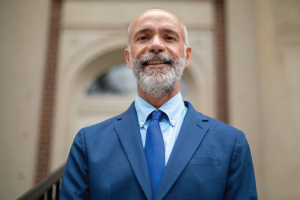The Well profiles UNC Hussman Dean Raul Reis

The Well recently profiled Raul Reis, dean of the UNC Hussman School of Journalism and Media. The story below continues The Well’s series of Q&As with Carolina’s newest deans.
Raul Reis is the dean of the Hussman School of Journalism and Media. He is also president of the national Association of Schools of Journalism and Mass Communication. Reis has a track record for creating nationally ranked programs over 25 years in academia, most recently as dean of the School of Communication at Emerson College. Reis has also worked as a reporter and editor for Brazilian and U.S. news organizations. He began his work at Carolina on July 1, 2022.
What’s something you’ve learned about Carolina and/or North Carolina since you arrived?
The reputation that Hussman has earned among its academic peers and industry leaders is longstanding and well-known. What has become clear after my first semester here is how the school has achieved such distinction. Carolina attracts exceptional students; Hussman is home to a faculty and staff with a deep commitment to helping students reach new heights; and we enjoy generous support from a network of alumni and donors who care about the school’s legacy and future.
I was given the great honor and education of touring North Carolina as part of last fall’s Tar Heel Bus Tour. It was an opportunity to listen and learn from the citizens we serve. The bus tour immersed my new Carolina colleagues and me in the rich diversity of cultures and livelihoods that create the fabric of one of the nation’s most dynamic states. I returned to Chapel Hill with a new perspective on what this University means to the state and the depth of impact we have every day on the lives of people across our state.
How is your school fulfilling Carolina’s mission of teaching, research and public service?
As dean of Hussman, I work to make sure everything we do serves the University’s teaching, research and service missions and honors our responsibility to our students, our state and the nation.
Media and journalism is among the most popular majors at Carolina, and enrollment continues an upward trajectory. Hussman students learn skills that prepare them for good jobs and career success across a wide spectrum of industries, and so many of our graduates enter North Carolina’s workforce.
We teach our students how to gather reliable information, consider diverse perspectives and think analytically. They learn to communicate with accuracy, clarity and purpose — and to embrace the power of data, emerging technologies and storytelling techniques.
Our scholars engage in the big questions and challenges of our day. Their research helps us better understand politics, promote good health, enable economic success and foster vibrant cultures and communities.
The service ethic at Hussman is deep and varied, from centers focused on broad societal and economic issues to service projects for individual clients:
Our Center for Innovation and Sustainability in Local Media focuses research and training on creating a sustainable future for local news — a critically important component of a healthy civic life and a well-functioning democracy.
Our North Carolina Scholastic Media Association works closely with the state’s high school journalism and media teachers, advisers and students.
As part of their coursework, students regularly develop communications campaigns for clients that include North Carolina businesses and nonprofits.
What’s one example of how you are addressing a top priority for your school?
Our school has enjoyed prominence, success and growth over many, many years. As we continue our forward momentum, one of my priorities is to focus on our people and strengthen our community.
We are working collaboratively as faculty, staff, students and administrators to build and foster an environment that is welcoming, inclusive and accessible to people with diverse backgrounds, experiences and beliefs. We want a school where every member of our community feels seen, heard, valued and respected.
As part of that work, I’ve convened a Dean’s Student Advisory Council with whom I meet regularly to keep an open and constructive dialogue with our students. We’ve also welcomed 12 new faculty and staff members to the school since I have become dean — each bringing diverse expertise and interests that enrich conversations within our community and the experience of our students.
Building and nurturing a welcoming and inclusive environment is more of a journey than a destination. I’m proud that as a school community, we are taking that important journey together.
In addition to serving as Hussman dean, you are also an active leader in media and journalism education at the national level. Can you tell us about that work?
I am privileged to work with the leaders of peer institutions across the nation to address many of the common interests and issues we share.
Last month, I met with a consortium of deans from 12 other top national programs that were selected to participate in the Carnegie-Knight Initiative on the Future of Journalism Education.
I also serve as president of the Association of Schools of Journalism and Mass Communication, an organization geared toward supporting deans, directors and chairs of peer programs that set high standards and promote excellence in our field.
I’m hosting the ASJMC national conference later this week in Charlotte. Our conference theme is “re-engagement” as we all emerge from two years of pandemic restrictions into a new post-pandemic reality. I’m looking forward to exploring strategies for how to engage and re-engage our many stakeholders, from students and faculty to community organizations, employers and alumni — and to bringing what I learn back home to Chapel Hill.